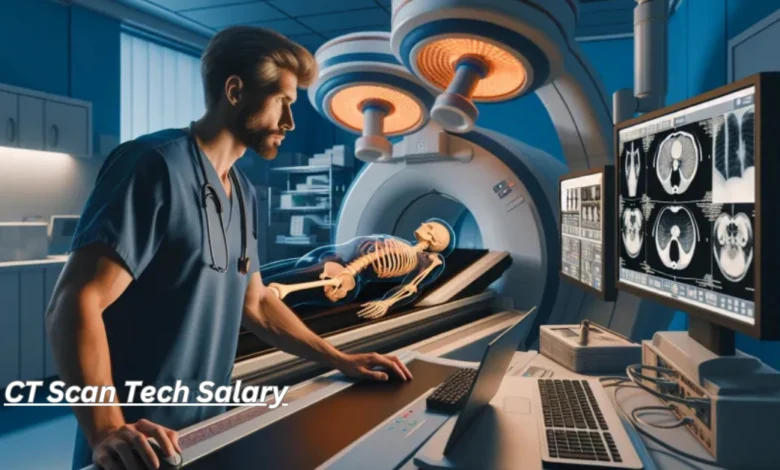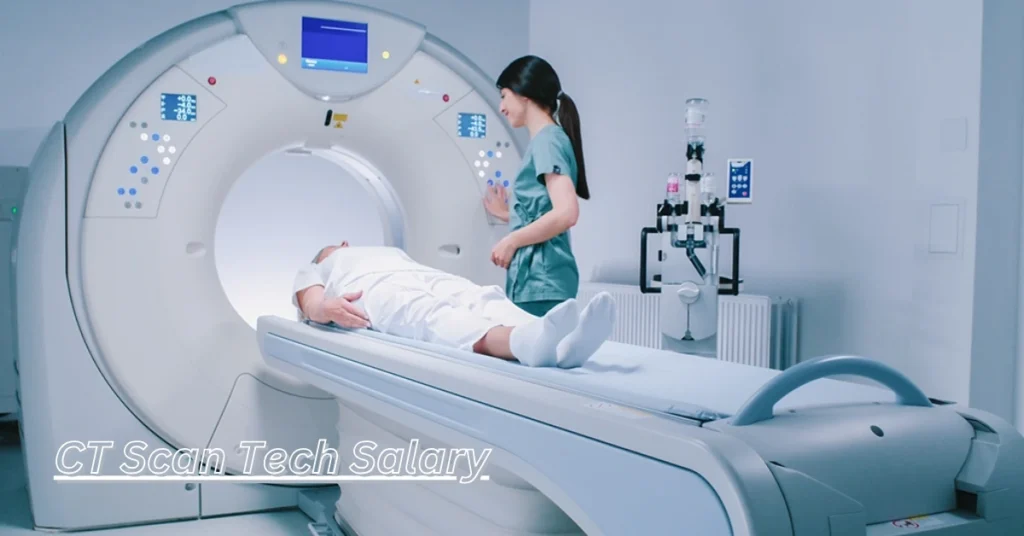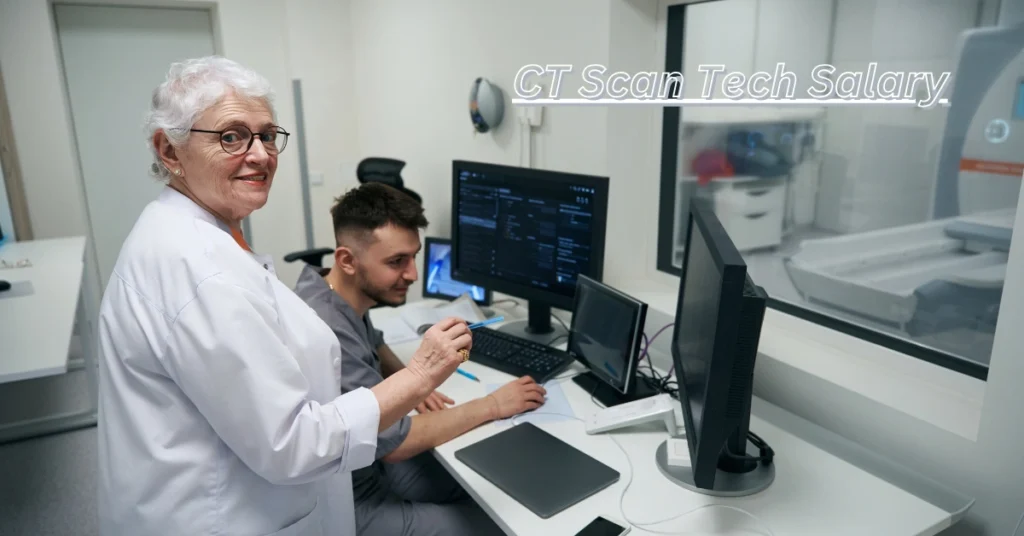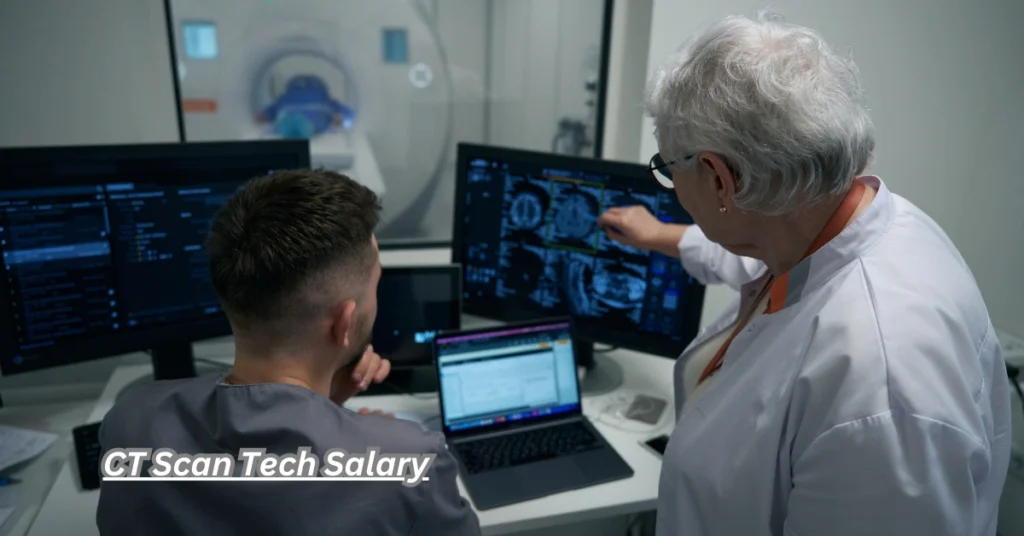CT Scan Tech Salary: A Comprehensive Guide

Introduction
A career as a CT Scan Tech Salary technician can be both rewarding and lucrative. With advancements in medical imaging technology and an increasing demand for skilled healthcare professionals, CT scan techs are in high demand. If you’re considering this career path, understanding the salary potential is crucial. This guide delves deep into the factors influencing CT Scan Tech Salary, career growth opportunities, and how you can maximize your earnings.
What Does a CT Scan Tech Do?

CT scan technicians operate specialized imaging equipment to create detailed internal images of patients. These images assist physicians in diagnosing and treating medical conditions. Responsibilities include:
- Preparing patients for scans by explaining procedures and ensuring they are comfortable.
- Operating and maintaining CT machines to ensure accurate imaging.
- Ensuring patient safety by following radiation protection protocols.
- Collaborating with radiologists, nurses, and other medical staff to provide optimal patient care.
- Documenting and maintaining patient records and imaging results.
CT Scan Tech Salary techs play a critical role in the healthcare system, ensuring timely and accurate diagnoses that can save lives. They work in hospitals, diagnostic imaging centers, and outpatient clinics, contributing to various medical fields such as oncology, neurology, and emergency care.
Factors Affecting CT Scan Tech Salaries
Several factors influence the salary of a CT scan technician:
1. Geographical Location
Salaries vary significantly depending on location. Urban areas and states with higher demand for healthcare professionals often offer higher pay.
- Highest-paying states: California, New York, and Massachusetts, where salaries can exceed $90,000 annually.
- Lower-paying regions: Rural areas in the Midwest and South, where salaries may average around $55,000 to $60,000.
- Metropolitan areas such as Los Angeles and New York City often offer higher salaries due to the cost of living and demand for specialized healthcare professionals.
2. Experience and Certifications
Experience and additional certifications can lead to higher salaries.
- Entry-level CT techs: Typically earn between $50,000 and $60,000 annually.
- Experienced professionals: Can command salaries ranging from $70,000 to $90,000 annually.
- Certifications such as ARRT (American Registry of Radiologic Technologists) in Computed Tomography or advanced imaging modalities can significantly boost earning potential.
- Continuing education and specialized training, such as cardiac or vascular CT imaging, can enhance expertise and salary.
3. Type of Employer
The type of healthcare facility also impacts earnings.
- Hospitals: Typically offer higher salaries and benefits due to the fast-paced environment and round-the-clock operations.
- Outpatient clinics: May pay less but often provide better work-life balance with regular hours.
- Private practices: Salaries can vary widely based on the practice’s size, patient volume, and location.
- Travel Technicians: Temporary or travel positions often offer premium pay, making it an attractive option for those who enjoy flexibility.
4. Specialization
Specializing in areas such as pediatric imaging, oncology imaging, or intervention radiology can further enhance salary prospects and job opportunities. Advanced skills in areas like 3D imaging reconstruction or dual-energy CT scans are also highly valued.
Average Salary Overview

National Average
According to the U.S. Bureau of Labor Statistics (BLS), the average annual salary for radio-logic technologists, including CT Scan Tech Salary, is approximately $65,000. CT-specific roles, however, often earn slightly more due to the specialized nature of the job, with averages ranging from $70,000 to $80,000 annually.
Salary by State
| State | Average Annual Salary |
|---|---|
| California | $92,000 |
| New York | $85,000 |
| Texas | $70,000 |
| Florida | $68,000 |
| Ohio | $62,000 |
Hourly Wages
Hourly wages for CT Scan Tech Salary range from $25 to $40, depending on factors such as experience, location, and type of employer. Overtime and shift differentials can further increase hourly earnings, especially in hospital settings.
Benefits Beyond Salary
Many employers offer comprehensive benefits packages, which can significantly enhance overall compensation. These benefits often include:
- Health Insurance: Comprehensive coverage for medical, dental, and vision.
- Retirement Plans: 401(k) plans with employer contributions.
- Paid Time Off (PTO): Vacation days, sick leave, and holidays.
- Continuing Education Opportunities: Support for obtaining advanced certifications or attending professional development courses.
- Flexible Scheduling: Particularly in outpatient clinics, which can improve work-life balance.
- Tuition Reimbursement: Programs that assist in covering the costs of further education.
- Wellness Programs: Including gym memberships or mental health services.
Career Growth Opportunities
Becoming a CT scan technician can be a stepping stone to other high-paying roles in healthcare imaging, such as:
- MRI Technologist: Average salary of $74,000 annually. MRI techs specialize in magnetic resonance imaging, a highly sought-after modality.
- Radiology Supervisor: Average salary of $90,000 annually. Supervisors oversee imaging departments, manage teams, and ensure compliance with medical regulations.
- Radiologist Assistant: With additional education and certifications, this role can earn over $100,000 annually, providing advanced-level support to radiologists.
- Educator or Trainer: Teaching future radiologic technologists or conducting corporate training sessions can open avenues for professional growth.
- Sales Representative for Medical Equipment: Leveraging technical knowledge to sell imaging devices can lead to lucrative careers outside clinical settings.
Tips for Maximizing Earnings

- Pursue Advanced Certifications: Specializing in multiple imaging modalities or obtaining ARRT certifications can make you a more competitive candidate.
- Relocate to High-demand Areas: Consider moving to states or cities with higher salary averages and greater demand for healthcare professionals.
- Seek Positions in Hospitals or Specialized Centers: These employers often offer higher pay and better benefits compared to smaller clinics or private practices.
- Gain Experience: Build your resume by taking on diverse roles and responsibilities, showcasing your expertise in various imaging techniques.
- Network Within the Industry: Attend conferences, join professional organizations, and build relationships with colleagues to learn about higher-paying opportunities.
FAQs
1. How long does it take to become a CT scan tech?
Most programs take 2-4 years, including certification and on-the-job training. An associate’s degree in radiologist technology is the most common pathway.
2. Are CT scan techs in demand?
Yes, the demand is expected to grow by 6% through 2032, according to the BLS, driven by an aging population and advancements in medical imaging.
3. Do CT scan techs work long hours?
Schedules vary. Hospitals may require shift work, including nights and weekends, while outpatient clinics often offer standard business hours.
4. Can CT scan techs specialize further?
Yes, they can specialize in areas like pediatric imaging, oncology imaging, or intervention radiology, opening up opportunities for higher pay and advanced roles.
5. What skills are essential for CT scan techs?
Key skills include attention to detail, strong communication abilities, technical proficiency with imaging equipment, and empathy for patient care.
6. How does continuing education impact salary?
Ongoing education and certifications can significantly boost earning potential by qualifying CT techs for advanced roles or specialized positions.
Conclusion
A career as a CT scan technician offers competitive salaries, excellent benefits, and numerous opportunities for growth. By understanding the factors that influence earnings and proactively enhancing your qualifications, you can position yourself for long-term success in this rewarding field. Whether you’re just starting or looking to advance your career, the potential for personal and professional fulfillment in this role is immense. With the right skills, certifications, and experience, CT Scan Tech Salary can achieve a stable and financially rewarding career in healthcare.
Discover the latest updates and insights in tech with our in-depth coverage at Techy Daily: Techy Daily.



